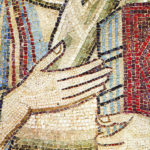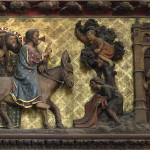We run our website the way we wished the whole internet worked: we provide high quality original content with no ads. We are funded solely by your direct support. Please consider supporting this project.
Christians and Politics: What are the different views?
How involved should Christians be in secular politics? Throughout history, Christians have embraced a number of different perspectives on this issue. These perspectives can basically be broken down into three groups.
First, some Christians believe that one of the church’s jobs is to transform and ultimately control politics. This view has often been labeled the transformational model and has been the dominant model among Calvinists. It was also popular with most nineteenth-century revivalists (e.g., Charles Finney, Dwight Moody) and the church throughout the Middle Ages. Since God is Lord of everything, Christians should seek to manifest this lordship in everything, including politics. They should therefore use any righteous means possible to sanctify the political system and seek to pass laws that reflect God’s will for people as revealed in Scripture.
At the opposite end of the spectrum are those who believe that Christians should not involve themselves at all in secular politics or at least should be wary of doing so. This oppositional model has been the traditional view among Anabaptists and is embraced by a number of noteworthy evangelical leaders today. Christ said his Kingdom was not of this world, and he never involved himself in the political debates of his day (John 18:36). Christians are called to be loyal to Christ’s Kingdom alone and to see themselves as citizens and ambassadors of the Kingdom of God living in a “foreign” land (e.g., Phil. 3:20). This present world, including its political systems, is under the control of Satan (e.g. Lk 4:5-7; I Jn 5:19). Therefore, trying to conform it to God’s will is futile and even dangerous. The power of the gospel is found in evangelism, sacrificial service and prayer, not in influencing the political process.
In between these two positions is the two-kingdoms model of church and state. This has been the dominant view of Lutherans and arguably the dominant view among American Christians. Unlike the oppositional model, this model holds that “secular” politics are under God’s authority. Unlike the transformational model, however, it does not hold that the politics of the world should be or can be transformed into a Christian system. Rather, secular government and the church are two ways that God works in the world, and they accomplish different purposes. The purpose of secular government is to keep sin in check and rule over sinners by force. The purpose of the church is to transform sinners into saints who do not need to be ruled by law, and to do so by the power of the gospel and prayer. Christians may or may not get involved in government, depending on their calling from God. But they should not think that any alterations they make in government, however laudable, will further the purpose of transforming lives the way God wants to transform them.
In my own view, there is no precedent in the New Testament to support the transformational model. Moreover, whenever Christians have succeeded in acquiring significant political authority, it’s been disastrous for the Church and society. There is some New Testament support for the two kingdoms model in that Paul clearly distinguishes God’s call to disciples of Jesus (Rom. 12:17-21) from God’s call to governments (Rom. 13:1-4). But there’s no biblical justification for this model’s idea that Christians can be involved in government in ways that may compromise their call to follow Jesus. For example, Jesus tells his followers to love and do good to their enemies (Lk 6:27-35). He doesn’t say to love and do good to your enemies unless you have to kill them as part of your duty to the state!
So I believe the oppositional model is most faithful to the New Testament. At the same time, I don’t think this means followers of Jesus are to have no political influence — which is how this model has usually been interpreted. While Jesus never entered the fray of political debates, everything about Jesus’ life revolted against the politics and social norms of his day. It’s why he was crucified. He was involved in what we today would call “non-violent civil disobedience.” In this sense Jesus was a political revolutionary. And since followers of Jesus are called to imitate him, we should aspire to do the same. We should not think it our job to solve political disputes. But we must consider it our Kingdom duty to revolt against all injustice by how we live.
Further Reading
- Clapp, Rodney. A Peculiar People: The Church as Culture in a Post-Christian Society. Downers Grove, Ill.: InterVarsity Press, 1996.
- Colson, Charles. Kingdoms in Conflict. Grand Rapids: Zondervan, 1987.
- Geisler, Norman, and Frank Turek. Legislating Morality. Minneapolis: Bethany, 1998.
- Niebuhr, H. Richard. Christ and Culture. New York: Harper, 1951.
- Noll, Mark A., et al. Adding Cross to Crown: The Political Significance of Christ’s Passion. Grand Rapids: Baker, 1996.
- Stassen, Glen H., D. M. Yeager, and John Howard Yoder. Authentic Transformation: A New Vision of Christ and Culture. Nashville: Abingdon, 1996.
- Thomas, Cal, and Ed Dobson. Blinded by Might. Grand Rapids: Zondervan, 1999.
- Webber, Robert E. The Church in the World: Opposition, Tension, or Transformation? Grand Rapids: Academie/Zondervan, 1986.
- The Secular Saint: The Role of the Christian in the Western World. Grand Rapids: Zondervan, 1979.
Category: Essays
Tags: Essay, Politics, Social Issues
Topics: Ethical, Cultural and Political Issues
Related Reading

Conservatives and Liberals in the Same Kingdom
Jesus did not allow the world to set the terms for what he did. For instance, he called Matthew, a tax collector, as well as Simon, a zealot, to be his disciples. Tax collectors were on the farthest right wing of Jewish politics, zealots on the farthest left. In fact, zealots despised tax collectors even…

The One True Image of God: God’s Self-Portrait, Part 4
This point is emphasized throughout the New Testament because, if we don’t get this, we are left to our own imaginations about God, and we’ll draw from a multitude of different sources to construct a mental picture of God that will, to one degree or another, fall short of the beauty of the true God…

Is the Book of Acts Reliable?
(Note: We apologize that certain German vowels didn’t translate onto this site). Introduction The book of Acts is of critical importance in the contemporary debate about the historical Jesus. The reason for this is straightforward. Those who deny that the original, historical Jesus made divine claims for himself, performed miracles and rose from the dead…

The Case For Believer’s Baptism
In this essay I briefly present my reasons for believing that baptism is intended only for people who are old enough to responsibly choose to become disciples of Jesus. I will first offer several biblical arguments, then offer a supporting argument and conclude by responding to several objects to believer’s baptism. Biblical Arguments Baptism…

Palm Sunday, Partisan Politics & the Power of the Cross
Today we’re sharing something from David D. Flowers that we found especially insightful as we approach holy week. We hope it blesses you and moves you to more fully manifest the kingdom that is not of this world. ~~~ We remember it in the church as Palm Sunday. This is the triumphal entry of Jesus into…

The “Christus Victor” View of the Atonement
God accomplished many things by having his Son become incarnate and die on Calvary. Through Christ God revealed the definitive truth about himself (Rom 5:8, cf. Jn 14:7-10); reconciled all things, including humans, to himself (2 Cor 5:18-19; Col 1:20-22), forgave us our sins (Ac 13:38; Eph 1:7); healed us from our sin-diseased nature (1…
